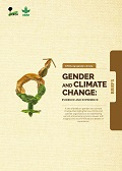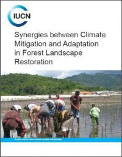Pricing forest carbon
Pricing forest carbon and putting in place the means and channels to pay for it are necessary conditions to achieve the 2030 mitigation goals. Yet, after more than 15 years of discussion, payments for
Pricing forest carbon and putting in place the means and channels to pay for it are necessary conditions to achieve the 2030 mitigation goals. Yet, after more than 15 years of discussion, payments for

This set of policy briefs seeks to address some of the most pressing policy issues concerning gender and climate change, by drawing on the extensive experience of each contributing partner organization.
Climate change is one of the greatest threats to human rights of our generation, posing a serious risk to the fundamental rights to life, health, food and an adequate standard of living of individuals
The purpose of this Agreement is to further implement the objective of the Convention as set out in its Article 2 through enhanced action, cooperation and support, in the context of sustainable development
A new report from the New Climate Economy finds that land use practices that restore degraded agricultural or forest lands and protect natural areas could reduce emissions by as much as 9.0 Gt CO2e by
The Ad Hoc Working Group on the Durban Platform for Enhanced Action agreed to transmit the text titled “Draft agreement and draft decision on workstreams 1 and 2 of the Ad Hoc Working Group on the Durban
Reducing emissions from deforestation and forest degradation, conservation of forest carbon stocks, sustainable management of forests, and enhancement of forest carbon stocks in developing countries (REDD+)
After over 20 years of international climate change negotiations, talks continue to move further away from identifying the root causes of the climate crisis. These short, sharp articles highlight years

This study entails extensive literature review of linkages between adaptation and mitigation at the global policy level, through analysis of relevant policies and protocols in the context of climate change
The sixth UNEP Emissions Gap Report provides a scientific assessment of the impacts of the submitted Intended Nationally Determined Contributions (INDCs) on anthropogenic emissions of greenhouse gases.
<p>Accurate quantification of forest carbon stocks is required for constraining the global carbon cycle and its impacts on climate. The accuracies of forest biomass maps are inherently dependent on the